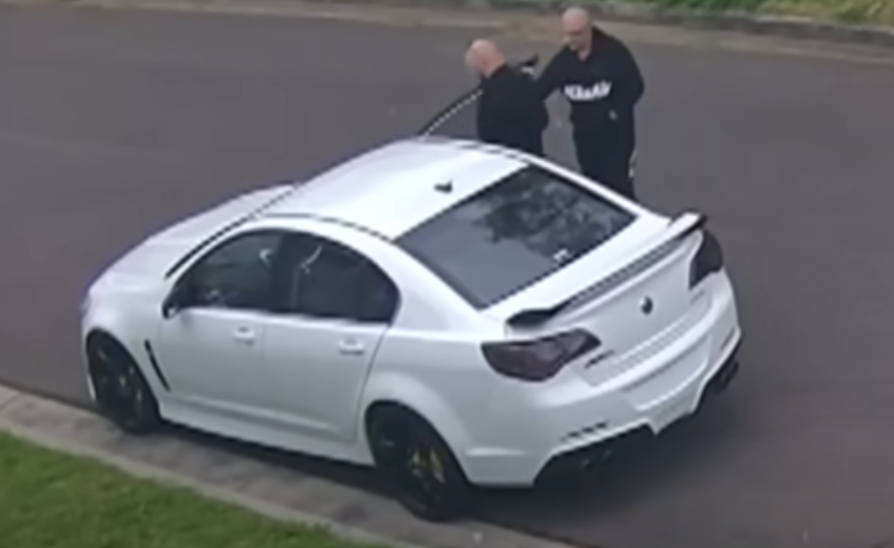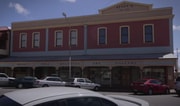
When 63-year-old Stephen Buttigieg listed his prized $120,000 Holden GTS on Facebook Marketplace, he had noble intentions—selling the collector's car to help his sons buy their first homes.
Within minutes of a seemingly innocent test drive, his generous gesture became a heart-wrenching lesson in how sophisticated thieves are targeting Australian families through social media platforms.
The theft, captured on Stephen's home security camera, has become emblematic of a disturbing trend that's sweeping across Australia.
Car theft remains a pressing issue across Australia, with a vehicle stolen approximately every 11 minutes, and online marketplaces have become the new hunting ground for criminals.
But Stephen's story reveals something even more troubling: how these sophisticated scams are increasingly targeting older Australians who are simply trying to help their families or make legitimate transactions online.
In this Article
The Devastating Moment Everything Changed
The scammer, who called himself 'Brendon', appeared to be the perfect buyer. Well-dressed, polite, and genuinely interested in the vehicle's features, he seemed like any other potential purchaser inspecting a high-end car. Stephen, a trusting father trying to do right by his children, had no reason to suspect anything was amiss.
Then came the classic distraction technique that would cost Stephen everything.
'He said, 'I think your boot light's coming on',' Stephen recalled, 'and I said, 'Are you sure?' And he said, 'But it's only when I put it in gear and reverse', and the car was going forward and back a bit. So I said alright, I'll check it.'
The moment Stephen stepped away to investigate the fabricated boot light issue, 'Brendon' seized his opportunity. Security footage shows Stephen firmly closing the boot just as the Holden speeds out of frame, leaving him standing motionless in his driveway, hands in pockets, processing what had just happened.
'I just froze, and I couldn't believe that he'd done that,' Stephen said. 'Like, he was such a nice person.'
The heartbreak in Stephen's voice when he addressed the thief directly reveals the deep personal impact these crimes have: 'Mate, if you would have come up and said, 'Give me $50,000', I probably would have thought about it and helped you out. You rip people off. It's no good mate. People work hard, you try to help your kids, and this is what happens.'
A Crime Wave Hitting Close to Home
Stephen's experience isn't an isolated incident—it's part of a rapidly growing crime wave that's targeting Australians through online marketplaces. The statistics paint a sobering picture of just how widespread this problem has become.
Motor vehicle theft recorded by police increased by 10 per cent from 2022 to 60,417 victims. In Stephen's home state alone, NSW had 14,516 cars reported stolen between March 2023 and March 2024, marking a 2.1 per cent increase compared to five years prior.
Even more concerning is how online platforms have become the preferred hunting ground for these criminals. Over 6,000 individuals have reported losing a total of $58.3 million to scams on social media during the first 10 months of 2024.
Just looking at one territory, ACT residents have lost nearly $326,000 to buying and selling scams with 485 cases reported so far in the territory in 2025.
'People work hard, you try to help your kids, and this is what happens.'
Research shows that scams on social media marketplaces are among the fastest-growing types of fraud, with Facebook Marketplace being particularly attractive to criminals due to its massive user base and the high-value items frequently listed there.
Why Holden GTS Cars Are Prime Targets
Stephen's Holden GTS wasn't just any car—it was a collector's item with significant value. HSV GTS models are available from $75,130 to $91,300 for 2017 models, with older collector versions commanding even higher prices.
The Holden Commodore VE (2006—2013) has consistently been the most stolen vehicle in Australia, making Stephen's car particularly attractive to thieves.
As a garage-kept collector's item that had never been driven, it represented the perfect combination of high value and low risk for criminals.
Why Seniors Are Prime Targets
What makes Stephen's story particularly troubling is that it reflects a broader pattern of criminals specifically targeting older Australians. The statistics reveal a disturbing truth: while scam losses decreased for most age groups, losses for people over the age of 65 increased by 13.3 per cent in 2023 to $120 million.
This targeting isn't accidental. Criminals deliberately seek out older victims for several reasons:
Higher Stakes Transactions: Seniors are more likely to own valuable items like classic cars, inherited jewellery, or property they're looking to sell to help family members.
Social Media Growth: In 2021, 45 per cent of seniors over 65 use social media, representing a rapidly growing market that criminals are eager to exploit.
Trust-Based Approach: Many seniors, like Stephen, operate from a foundation of trust and good faith, making them more susceptible to well-presented scammers who appear genuine and polite.
Financial Impact: Older Australians often have life savings and valuable assets that represent decades of hard work, making the financial impact of these crimes particularly devastating.
Did you know?
Did you know?
Contrary to popular belief about car theft methods, 70 per cent of cars are stolen with their keys rather than through 'hot-wiring'. This makes distraction techniques like the one used on Stephen increasingly common, as thieves find it easier to trick owners into leaving their vehicles than to break into them.
The Distraction Playbook: How These Scams Work
The technique used on Stephen—the fake 'boot light' issue—is part of a well-established playbook that criminals use to separate car owners from their vehicles during test drives. Understanding these methods can help you recognise them before it's too late.
Common Distraction Techniques:
- The Technical Problem: Just like Stephen experienced, the buyer claims there's a problem with the car that requires the seller's immediate attention—boot lights, strange noises, warning lights, or mechanical issues that need 'checking'.
- The Payment Drama: The buyer creates urgency around payment, claiming their banking app isn't working properly or that they need the seller to help them complete the transaction on their phone.
- The Documentation Distraction: The scammer asks to see paperwork, insurance documents, or service records, getting the seller to leave the vehicle to retrieve them from inside the house.
- The Emergency Call: The buyer receives a 'urgent' phone call and asks the seller to step away for privacy, or claims they need to take notes about something 'important'.
The Psychology Behind the Scam:
These techniques work because they exploit our natural instincts to be helpful and accommodating. The criminals deliberately:
- Build Rapport: They present as likeable, well-dressed, and genuinely interested buyers
- Create Urgency: They manufacture problems that seem to require immediate attention
- Exploit Trust: They rely on the seller's assumption that someone willing to inspect an expensive car must be legitimate
- Use Distraction: They give the seller a specific task that requires stepping away from the vehicle
Your Safety Toolkit: Protecting Yourself and Your Family
The good news is that with the right precautions, you can significantly reduce your risk of falling victim to these sophisticated scams. Here's your comprehensive safety toolkit:
Before Listing Your Item:
- Document Everything: Take detailed photos and videos of your item, including serial numbers, unique features, and any imperfections. This documentation could be crucial for police investigations.
- Research Market Value: Know what your item is worth so you can spot unrealistic offers that might indicate a scam.
- Prepare Your Story: Have a clear, consistent explanation for why you're selling. Scammers often probe for personal information they can use later.
During Initial Contact:
- Trust Your Instincts: If something feels off about a potential buyer's communication, trust that feeling. Legitimate buyers don't typically create pressure or urgency.
- Verify Identity: Ask for a full name and phone number. Legitimate buyers shouldn't hesitate to provide this information.
- Stay on Platform: Keep initial communications within Facebook Messenger or the platform's messaging system where there's a record of conversations.
Meeting Arrangements:
- Choose Public Locations: Meet at busy shopping centres, police station car parks, or other well-lit public spaces with security cameras.
- Bring Support: Take a trusted friend or family member with you. There's safety in numbers, and scammers prefer isolated victims.
- Daytime Meetings: Schedule inspections during daylight hours when there are more people around.
- Tell Someone: Let another family member know where you're going, who you're meeting, and when you expect to return.
During the Inspection:
- Never Leave Keys in the Vehicle: This is absolutely critical. Seventy per cent of cars are stolen with their keys, making key control your most important defence.
- Stay Alert: Be wary of any requests that require you to step away from the vehicle or become distracted.
- Control the Test Drive: If you allow a test drive, maintain control. Consider driving yourself while the buyer observes, or ensure you're always in the vehicle.
- Watch for Red Flags: Multiple people arriving, last-minute changes to meeting arrangements, or unusual behaviour should set off alarm bells.
Payment and Completion:
- Secure Payment Methods: Use methods that offer buyer protection like PayPal Goods and Services, or accept cash only for smaller items.
- Verify Funds: For large transactions, meet at a bank where funds can be verified immediately.
- Complete Documentation: Ensure all paperwork is properly completed and signed before handing over keys or items.
Recovery and Insurance: The Harsh Reality
Stephen's situation highlights a crucial issue that many Australians don't consider: insurance coverage for collector vehicles and unregistered cars.
The Insurance Gap:
Stephen's Holden GTS was stored away in a garage and had never been driven, meaning the car had no licence plates and was not insured. This situation is more common than you might think, particularly with:
- Collector cars kept as investments
- Project vehicles being restored
- Cars inherited from family members
- Vehicles being prepared for sale
Understanding Your Coverage:
- Comprehensive Car Insurance: Only covers registered, insured vehicles and typically requires the owner to be present during theft.
- Home and Contents Insurance: May provide some coverage for vehicles stolen from your property, but coverage limits are often insufficient for high-value cars.
- Collector Car Insurance: Specialized policies exist for classic and collector vehicles, but many owners are unaware of these options.
Example Scenario
- Margaret, 72, inherited her late husband's restored 1969 Ford Mustang. Like Stephen, she kept it in her garage and rarely drove it. When she decided to sell it to fund home renovations, she listed it online.
- Fortunately, Margaret had specialist collector car insurance that covered theft even when the car wasn't registered. When scammers attempted a similar distraction theft, her insurance provided full replacement value coverage.
Community Support and Resources
No one should face the aftermath of these crimes alone. Australia has several support systems and resources available to help victims and prevent future crimes.
Immediate Support:
- Police Assistance Line: 131 444 for non-emergency reporting
- Emergency Services: 000 if the crime is in progress or you're in immediate danger
- Scamwatch: Online reporting through the National Anti-Scam Centre
Ongoing Support:
- National Seniors Australia: Provides scam education and support resources specifically designed for older Australians
- eSafety Commissioner: Offers cybersecurity education and assistance
- Be Connected: Free digital literacy programs specifically for seniors
Community-Based Help:
- Neighbourhood Watch: Local crime prevention networks that help communities stay vigilant
- Community Legal Centres: Free legal advice for victims of crime
- Financial Counselling: Support for dealing with financial impacts of theft
Senior-Specific Scam Support
National Seniors Australia has partnered with the Australian Federal Police to create specialised resources for older Australians.
Their 'Keep Scam SAFE' campaign provides education specifically designed for seniors, including workshops, guides, and even free fridge magnets with safety reminders.
These resources acknowledge that seniors face unique risks and deserve targeted support.
The Silver Lining: Learning and Moving Forward
While Stephen's story is heartbreaking, it's also become a powerful teaching tool that's helped countless other Australians avoid similar fates. His willingness to share his experience publicly demonstrates the resilience and community spirit that defines Australian seniors.
What Stephen's Story Teaches Us:
- Trust Your Community: Stephen's openness about his experience helps protect others from similar scams
- Scams Aren't About Intelligence: Even cautious, intelligent people can fall victim to sophisticated criminals
- Recovery Is Possible: While financial recovery might not always be complete, emotional recovery and helping others is equally important
- Prevention Works: Armed with knowledge, future victims can protect themselves
Moving Forward Safely:
The goal isn't to retreat from online marketplaces entirely—they remain valuable tools for legitimate buyers and sellers. Instead, it's about approaching them with appropriate caution and knowledge.
Remember that legitimate buyers:
- Don't mind meeting in public places
- Are willing to provide identification
- Don't create false urgency
- Respect your safety requirements
- Are understanding if you want to bring someone with you
Essential Protection Strategies
- Never leave keys in your vehicle during inspections
- Meet only in busy, well-lit public places with security cameras
- Bring a trusted friend or family member to all meetings
- Trust your instincts—if something feels wrong, it probably is
- Document everything and tell someone where you're going
- Consider collector car insurance for valuable vehicles
- Report suspicious behaviour immediately to police
What This Means For You
Stephen's courage in sharing his story publicly has already helped prevent other thefts. Similarly, your awareness and vigilance contribute to community safety. When we look out for each other, we make it harder for criminals to operate successfully.
The criminals who target people like Stephen rely on isolation, surprise, and trust. By building strong, informed communities, we turn their tactics against them. Stephen's final message to the thief who stole his car reveals his character: even after being victimised, he showed more concern for helping others than seeking revenge.
That spirit of community support and mutual protection is what will ultimately help us fight back against these sophisticated criminals.
Have you or someone you know encountered suspicious behaviour while selling items online? We'd love to hear about your experiences and any additional safety tips you've discovered. Your insights could help protect another Australian family from going through what Stephen experienced. Share your thoughts and stories in the comments below.
Original Article
https://au.news.yahoo.com/gutting-m...w-crime-trend-sweeps-australia-234554545.html
Car Theft in Australia: Recent Trends and How to Protect Your Vehicle in 2025
Cited text: Car Theft in Australia: A Growing Concern Car theft remains a pressing issue across Australia, with a vehicle stolen approximately every 11 minutes.
Excerpt: Car theft remains a pressing issue across Australia, with a vehicle stolen approximately every 11 minutes
https://stealstopper.com.au/blogs/n...rends-and-how-to-protect-your-vehicle-in-2025
Car Theft in Australia: Recent Trends and How to Protect Your Vehicle in 2025
Cited text: Car theft remains a pressing issue across Australia, with a vehicle stolen approximately every 11 minutes.
Excerpt: Car theft remains a pressing issue across Australia, with a vehicle stolen approximately every 11 minutes
https://stealstopper.com.au/blogs/n...rends-and-how-to-protect-your-vehicle-in-2025
Recorded Crime—Victims, 2023 | Australian Bureau of Statistics
Cited text: Motor vehicle theft recorded by police increased by 10 per cent from 2022 to 60,417 victims.
Excerpt: Motor vehicle theft recorded by police increased by 10 per cent from 2022 to 60,417 victims
https://www.abs.gov.au/statistics/people/crime-and-justice/recorded-crime-victims/latest-release
Car Theft in Australia: Recent Trends and How to Protect Your Vehicle in 2025
Cited text: In New South Wales alone, 14,516 cars were reported stolen between March 2023 and March 2024, marking a 2.1 per cent increase compared to five years prior (so...
Excerpt: NSW had 14,516 cars reported stolen between March 2023 and March 2024, marking a 2.1 per cent increase compared to five years prior
https://stealstopper.com.au/blogs/n...rends-and-how-to-protect-your-vehicle-in-2025
Car Theft Statistics Australia—How Many Vehicles are Stolen Each Year & What is the Most Stolen Car? | CarsGuide
Cited text: In NSW alone, there were 14,516 cars stolen between March 2023 to March 2024; which was 2.1 per cent higher than it was five years ago.
Excerpt: NSW had 14,516 cars reported stolen between March 2023 and March 2024, marking a 2.1 per cent increase compared to five years prior
https://www.carsguide.com.au/car-ad...hicles-are-stolen-annually-and-which-model-is
Facebook Marketplace Scam Alert—Australian Business Journal
Cited text: Over 6,000 individuals have reported losing a total of $58.3 million to scams on social media during the first 10 months of 2024.
Excerpt: Over 6,000 individuals have reported losing a total of $58.3 million to scams on social media during the first 10 months of 2024
https://theabj.com.au/2025/01/19/facebook-marketplace-scam-alert/
Canberra residents face surge in Facebook Marketplace scams | The Canberra Times | Canberra, ACT
Cited text: ScamWatch statistics for 2025 until May show ACT residents have lost nearly $326,000 to buying and selling to scamsters with 485 cases reported so far...
Excerpt: ACT residents have lost nearly $326,000 to buying and selling scams with 485 cases reported so far in the territory in 2025
https://www.canberratimes.com.au/st...nts-face-surge-in-facebook-marketplace-scams/
Facebook Marketplace Car Scams | CEL Solicitors
Cited text: It found that scams on social media marketplaces are among the fastest-growing types of fraud.
Excerpt: scams on social media marketplaces are among the fastest-growing types of fraud
https://celsolicitors.co.uk/facebook-marketplace-car-scams/
Seniors top scammers’ hit list—National Seniors Australia
Cited text: Losses for people over the age of 65 increased by 13.3 per cent in 2023 to $120 million.
Excerpt: losses for people over the age of 65 increased by 13.3 per cent in 2023 to $120 million
https://nationalseniors.com.au/news/latest-news/seniors-top-scammers-hit-list
Seniors top scammers’ hit list—National Seniors Australia
Cited text: In 2023, those losses increased by 13.3 per cent to $120 million.
Excerpt: losses for people over the age of 65 increased by 13.3 per cent in 2023 to $120 million
https://nationalseniors.com.au/news/latest-news/seniors-top-scammers-hit-list
How To Keep Seniors Safe in the Digital Age: A Social Media Guide
Cited text: In 2021, 45 per cent of seniors over 65 use social media.
Excerpt: In 2021, 45 per cent of seniors over 65 use social media
https://allaboutcookies.org/social-media-safety-for-seniors
Car Theft Statistics Australia—How Many Vehicles are Stolen Each Year & What is the Most Stolen Car? | CarsGuide
Cited text: Seventy per cent of cars are stolen with their keys!
Excerpt: Seventy per cent of cars are stolen with their keys
https://www.carsguide.com.au/car-ad...hicles-are-stolen-annually-and-which-model-is
Top 10 tips to prevent a thief stealing your car—Neighbourhood Watch Victoria
Cited text: 7 out of 10 cars are stolen with their own keys, so keep your keys somewhere hidden and secure.
Excerpt: Seventy per cent of cars are stolen with their keys
https://nhw.com.au/cars-and-vehicles/preventing-car-theft/
Car Theft in Australia: Recent Trends and How to Protect Your Vehicle in 2025
Cited text: Nationally, the Australian Bureau of Statistics estimated that 55,000 households experienced motor vehicle theft in the 2022—23 financial year, with 5...
Excerpt: stored away in a garage and had never been driven, meaning the car had no licence plates and was not insured
https://stealstopper.com.au/blogs/n...rends-and-how-to-protect-your-vehicle-in-2025
Majority of car thefts happen at home | Australian Bureau of Statistics
Cited text: William Milne, ABS head of crime and justice statistics, said: “An estimated 55,000 households had a motor vehicle stolen in the last 12 months, with ...
Excerpt: stored away in a garage and had never been driven, meaning the car had no licence plates and was not insured
https://www.abs.gov.au/media-centre/media-releases/majority-car-thefts-happen-home







